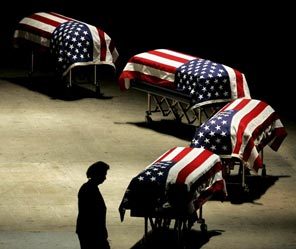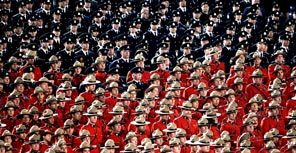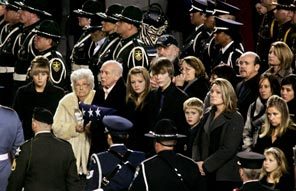Originally published December 9, 2009 at 12:09 AM | Page modified December 9, 2009 at 1:31 AM
![]() Comments (0)
Comments (0)
![]() E-mail article
E-mail article
![]() Print
Print
![]() Share
Share
Officers' service steeped in tradition, brotherhood
There was biting cold and hours of waiting. There were mourners pouring in by the bus load, from Bozeman and Boston, Las Vegas and Lake Stevens. There was pain and sadness and anger. Yet at the memorial service for the four fallen Lakewood police officers held Tuesday at the Tacoma Dome, it was strikingly quiet.
ALAN BERNER / THE SEATTLE TIMES
Gov. Chris Gregoire leaves the podium after speaking at the Lakewood Police Officers memorial.
Complete coverage
Follow on Twitter at #wamemorial
Video | Remembering the fallen Lakewood officers
List of agencies entering McChord AFB (Pierce County)
Officer obituariesThere was biting cold and hours of waiting. There were mourners pouring in by the bus load, from Bozeman and Boston, Las Vegas and Lake Stevens. There was pain and sadness and anger.
Yet at the memorial service for the four fallen Lakewood police officers held Tuesday at the Tacoma Dome, it was strikingly quiet.
For the thousands of mourners who came to pay their respects — the vast majority of them in law enforcement — words seemed to matter little. The ceremony was about brotherhood. It was about ritual and tradition. And it was a glimpse into a world that most of us can little comprehend.
Ten days ago, the community was torn apart when Sgt. Mark Renninger and Officers Tina Griswold, Ronald Owens and Gregory Richards were shot to death as they sat in a coffee shop, working at their laptops.
Now, to begin to heal from what the governor called the "darkest day in the history of law enforcement in Washington," it was time to come together.
Hundreds line route
The day began before 9 a.m. at McChord Air Force Base, where law enforcement from more than 370 agencies mustered to begin a somber 10.3-mile drive to the arena. Two thousand vehicles long, the procession crawled. It would take until 2 p.m. for the last car finally to arrive — an hour after the memorial was scheduled to start.
As the temperature hovered in the 20s at McChord, an Air Force sergeant in his blue dress uniform stood at attention, unflinching, for three hours and 15 minutes, until the final car left the base.
"It was what I felt I needed to do," said Sgt. Chad Gloor.
People from the community gathered along the procession route. Before last week, the officers were unknown to much of the outside world. Tuesday, the passing of these strangers' hearses brought tears.
Hundreds lined a stretch of South Tacoma Way, holding flags and signs, taking photos and videos. Some stood with their hands over their hearts, weeping quietly. Officers touched their hands to their car windows as they passed.
Eileen Melberg, who works at a law firm along the route, said seeing the flag-draped coffins made her gasp.
![]()
Roxanne Clouse, barely able to speak without crying, said she "wanted to be a part of this, support the ones who are here and let them know they all matter. I'm here to feel the cold for those that can't."
At the Dome, snipers stood on the roof with binoculars and high-powered weapons, scanning the crowd. Bomb-sniffing dogs were at the ready. In all, scores of officers were on the job working at the event, whether it was checking IDs at the entry gates or helping close off the streets nearby.
With warnings about crowds and parking problems, members of the community were encouraged to watch the service from satellite locations and to leave the Dome to the law-enforcement family. As a result, the arena was filled with uniforms, with few outsiders.
A brotherhood of blue
Officers came from the New York Police Department and from the Menominee Indian Reservation, from Arizona and Boston. They wore bomb-squad black and Royal Canadian Mounted Police red. They wore the uniforms of the military, the state Department of Corrections and the Federal Protective Service.
By 10:30 a.m., the arena plaza that typically bustles with the whoops of sports fans or the strains of country music was somber. Before the procession approached, officers formed two lines, standing shoulder to shoulder and creating an aisle leading to the entrance.
And they waited. They didn't crane their necks to see what was going on; they didn't chat or even shiver, though they wore no overcoats. They stood in silence waiting for the hearses to arrive.
Helicopters buzzed overhead. A bugle cried out. Bagpipes began a dirge.
The event would be "steeped in tradition," one of the organizers said. And it was. Four white hearses passed under an enormous American flag that had been hung between the crossed ladders of two fire engines. On command, the hearse doors were opened in unison, the caskets were pulled out, and the pallbearers took up their burdens.
Family members followed the caskets, arm in arm. But the service couldn't yet begin. There were still hundreds of cars in the procession that had not yet arrived.
Inside the Dome, officers milled around quietly.
"It's the same job anywhere you go," said Luis Turcaz, an officer with the Las Vegas Metropolitan Police Department. "I can't tell you how many times I've sat at a Starbucks, face to face with another officer. I'm watching his back and he's watching mine.
"You're in uniform. You're armed. You think you're safe," he said. "This could have happened to any of us."
Turcaz, like officers from several other jurisdictions, left a police patch near the stage, a show of respect to let the families know that LVMPD was there.
Three officers stood near the flag-draped caskets — hands clasped, eyes downcast, unblinking, as if they were in a trance. Members of the honor guard, they're practiced at this routine, but no one can stand this way for too long. In a slow and elaborate ritual, the officers were relieved by other members of the honor guard every 15 minutes or so, over and over until the funeral was over.
Just after 2 p.m., another honor-guard contingent began marching toward the center aisle of the stadium. Family members followed in groups of 20, 30, 40 for each officer. Some held teddy bears and some were in wheelchairs. A little boy let out a quick wail, and was scooped up by his mother. The bagpipes began again.
It would be another half-hour or so for the speakers to begin, but the audience didn't squirm.
Memories of the fallen
Shortly before 3 p.m., Lakewood Police Chief Bret Farrar spoke of the fallen officers. "I wish they could see the outpouring of love we've seen in the last week," he said. "The hug meter must be up 10- or 12,000 by this point. Everywhere I go, I get a hug."
Friends, family and colleagues then spoke about the fallen officers.
Renninger was a SWAT officer, through and through, a guy who seemed to know where to find the crooks, even when they were on the run.
"We didn't need a canine," said Mike Villa, assistant chief of the Tukwila Police Department, where Renninger worked before joining Lakewood. "We had the man-tracker working on our crew."
Griswold may have been small, but she was tough, said her friend Pamela Battersby. "She was a tomboy who loved riding motorcycles and mixed martial arts."
But Griswold "also had a soft side and enjoyed being a woman," Battersby said.
Owens loved sports, motorcycles and of course his daughter, said his older sister, Ronda LeFrancois. In high school, he entertained her friends by break dancing in the kitchen and singing Barry Manilow songs.
"I would do anything to go back to those days," LeFrancois said, holding back tears.
Richards "had a smile and laughter that radiated like sunshine," said his 16-year-old son, Austin. Just about everything made him happy.
"We were always No. 1," Austin said. Despite the pressures of the job, "he didn't become more hardened or angry, just more thankful."
His 15-year-old daughter, Jami-Mae, said her father collected lifelong friends. "My dad knew how to spot a good person and value them always."
Gov. Chris Gregoire spoke last, offering her condolences to the families on behalf of the state.
"We will remember them today," she said. "We will remember them always."
Around 5 p.m., three hours after the ceremony started, the honor guard began leading the families from the stadium.
A recording made by a Lakewood police dispatcher was played over the loudspeaker, announcing each officer by number, and then: "Gone but not forgotten."
This story was reported by staff writers Maureen O'Hagan, Marc Ramirez, Jack Broom, Lynn Thompson, Christine Clarridge, Mark Rahner and Jonathan Martin. It was written by O'Hagan.
UPDATE - 09:46 AM
Exxon Mobil wins ruling in Alaska oil spill case
NEW - 7:51 AM
Longview man says he was tortured with hot knife
Longview man says he was tortured with hot knife
Longview mill spills bleach into Columbia River
NEW - 8:00 AM
More extensive TSA searches in Sea-Tac Airport rattle some travelers

Entertainment | Top Video | World | Offbeat Video | Sci-Tech
general classifieds
Garage & estate salesFurniture & home furnishings
Electronics
just listed
More listings
POST A FREE LISTING





